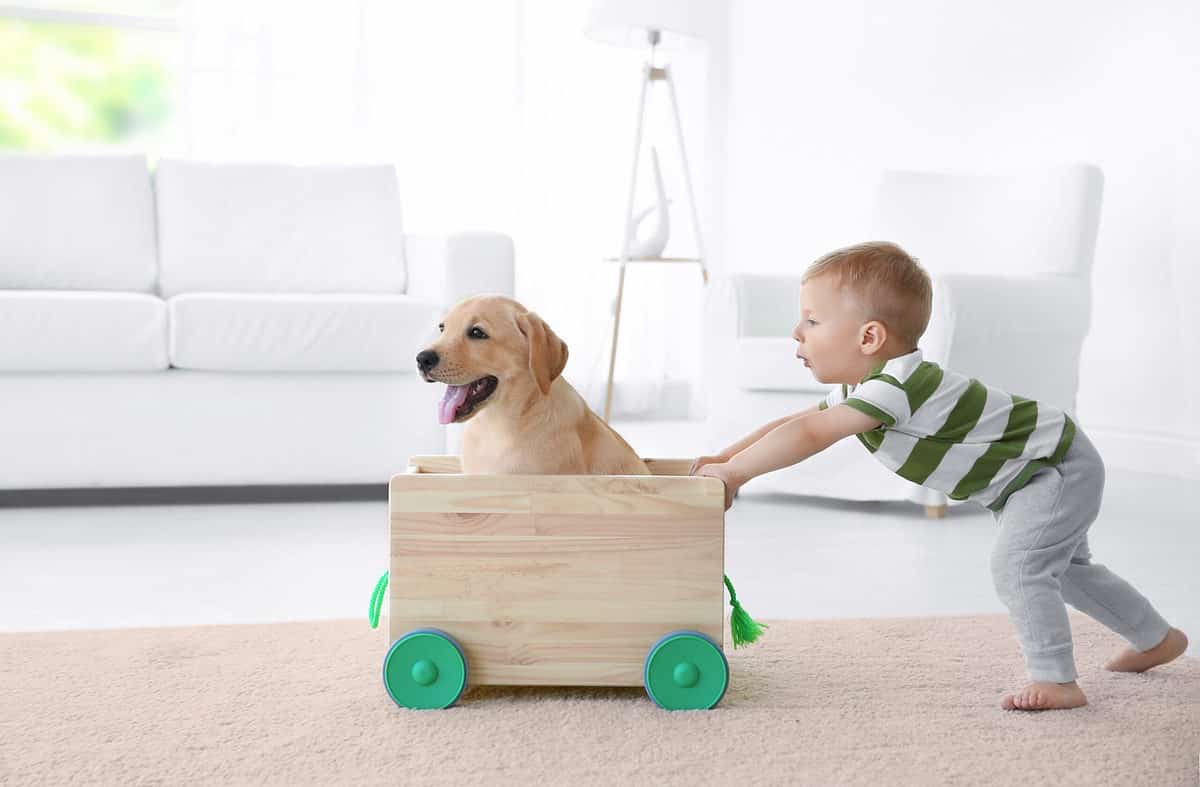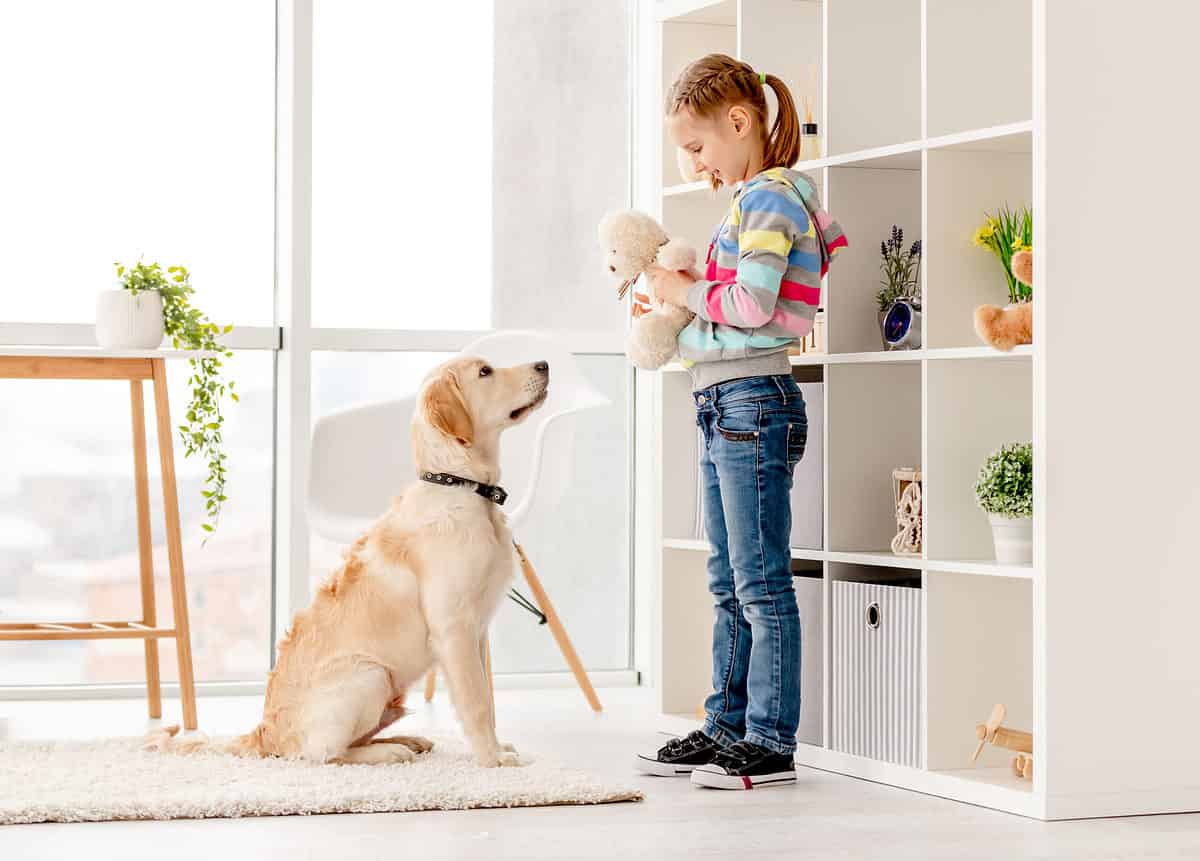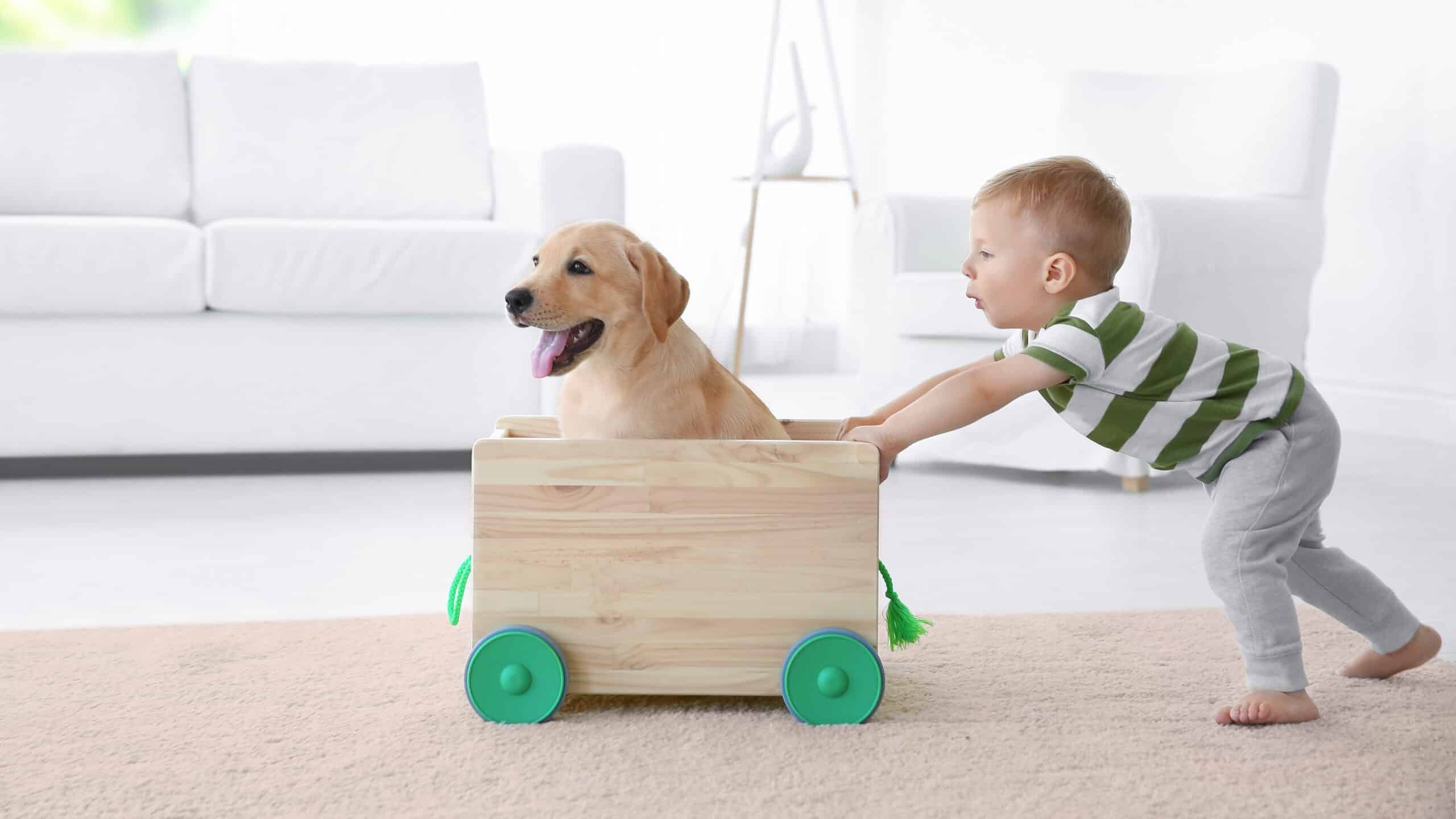The labrador retriever is considered one of the most popular dog breeds currently in existence, so it is common for many families to want to add one to the household. However, if you have younger children, then you may be wondering if a larger dog, like a lab, may be appropriate or safe for your kids. Today, we will tell you a bit about labrador retrievers, whether they are good with kids, and how you can help your children feel comfortable in their company.
How Big Do Labrador Retrievers Get?
If you have smaller children, then you may be concerned that a large dog may cause too much chaos. While that may be true in many cases, most pups are friendly, and they will not become violent or overly rambunctious.

©Africa Studio/Shutterstock.com
As far as size, labs are considered a medium to large breed. Typically, a male lab will weigh between 65 to 80 pounds. As far as height, you can expect a male labrador to stand about 22 to 25 inches tall at the shoulder. A female labrador can weigh between 55 to 70 pounds and stand 22 to 24 inches tall.
How Much Energy Do Labrador Retrievers Have?
You often see many labrador retrievers out at the park, and that is because they are a high-energy breed and they require constant mental and physical stimulation to maintain their proper behavior and good health. Labrador retrievers were originally bred as working dogs because they have a lot of energy, even when they are young, so they are great at many things.
Training Labs as Puppies
If you get a lab as a puppy, then you need to take the time to train them properly so that they can contain their energy as they age. You really need to start training the day that you bring them home. Start by teaching them basic commands like “come,” “sit,” and “stay.” As you train them, you should help them to learn with positive reinforcement. Focus on reward-based training by offering praise, treats, and affection in exchange for good behavior.
It is a good idea to keep training sessions short, usually about 15 minutes at a time. This is because lab puppies typically have a short attention span. Effective training won’t happen overnight. You need to be consistent and stick to it. Use the same commands and the same rewards every time, so your puppy knows how to respond properly.
Once you have a hold of the initial training, get your puppy around other people. Socialization is essential, so get your dog out to the dog park, bring them on walks, and bring them into different environments. This is important because you do not want your dog to become skittish when they experience something new, like seeing your kids. This is so important. If you are having trouble training your pup, then seek out a professional dog trainer.
How Much Maintenance Do Labrador Retrievers Require, and What is the Cost?
In general, labrador retrievers are typically considered to be relatively low maintenance. They are typically in line with other medium to large dogs when it comes to cost.
Typical Maintenance Requirements
If you put your kids in charge of maintaining the dog, then you will need to train them how to do it properly. Labs have short but dense coats that can shed frequently. In order to keep their coat in good condition, you will want to brush them regularly.
The main part of maintaining your labrador retriever that you will want to keep on top of is exercise. Remember that these are high-energy dogs, and if they don’t get the exercise they need when you want them to, then they could act out around your kids. Take them outside for daily walks and runs, and go out in the backyard to play whenever you can.
As far as diet, it is important to feed them a balanced diet, or they can easily become overweight. Of course, in addition to all of this, you should also bring labs to the vet on a regular basis so they can get their shots and preventative care.
Costs for Labs
During the first year of owning a labrador retriever, you can expect to pay upwards of $3,000 for the initial price of the dog, the initial supplies (dog bowl, bed, outdoor supplies), and potential training costs.
Once you have trained your lab, you can expect to pay about $400-$1,500 per year for food, play, and vet visits. It depends on the brand of food you buy, how many toys you purchase every year, and so on. In this respect, owning a dog is similar to having a child because the costs that you pay will also depend on the food you buy and what you purchase for them on a regular basis.
It is important that you look at your budget. If you just had a new child, then you will have to factor in those costs first. If you have anything left over, then consider buying the dog.
How Old Should Your Child Be When You Get a Labrador Retriever?

©Tatyana Vyc/Shutterstock.com
In general, labs are warm, friendly, and affectionate dogs. That is why you see so many families with a labrador retriever in tow. They are great for kids with families because when they run and play, they encourage your kids to do the same, and that is great for their mental and physical development.
However, they are still larger dogs that need to be properly handled. For that reason, most experts recommend that you wait to bring a labrador retriever into the home until your child is at least 6 years of age. It is at this time that your kids will understand what a dog is and that the animal does not mean any harm. This is also a good time because your child will understand the safety rules and guidelines associated with owning a dog. With that said, every family is different, so only you can properly determine if your child is old enough to handle the responsibility.
Just remember that a larger dog like this requires a lot of responsibility. Parents need to realize that they will have a lot on their hands when caring for a lab and a child at the same time, so take an honest look at your situation before you move forward.
Are Allergies an Issue with Labrador Retrievers?
As with many dog breeds, there is the potential that your child or someone in your family could have an issue with allergies if you own a labrador retriever. There are people that are allergic to various substances in the lab’s skin cells, saliva, or urine. Some people are also allergic to dander and pet hair, which is often the side effect of owning any dog. If someone was allergic to the pet, then they would likely experience itchy eyes, runny nose, sneezing, asthma, and skin rashes.
With that said, not everyone who has allergies will be allergic to your labrador retriever, so you will need to do your research ahead of time. If your child has a history of allergies or you believe that they may be allergic to dogs, then a good test is to bring your child around a lab owned by another family. In the case that your child doesn’t have any adverse reactions, then you might be in good shape.
If you or your child only has a mild reaction, then you may be able to further mitigate the allergies by putting air purifiers around the house and by washing your hands whenever you get the opportunity.
General Tips and Precautionary Measures
Along with all of the information shared above, you will also need to take certain precautions at home before you allow your labrador retriever near kids.
Care around infants – If your child is very young, then you will want to keep them away from the dog as often as possible. Although labs, in general, are very gentle and not aggressive, they may not know how to act around a toddler or baby.
Caution while crawling – If your baby is just learning how to crawl and they cannot walk, then it is a good idea to keep your dog away from them. This is because there is a chance that they could run into each other.
Provide Strict Instructions – Older kids who can speak and comprehend instructions should be taught how to not bother or irritate the dog. Even though labrador retrievers are gentle, any animal could get irritated when bothered. In general, teach your child not to pinch, poke, or climb on the dog.
Warn about eating or sleeping – Remind your kids that just like them, your dog should not be bothered when it is eating and sleeping. Although they may not mean harm, a surprised dog could react defensively, and it could lead to harm.
Teach the dog about hugs – Kids love to hug dogs, but if your labrador retriever is unaware of what a hug is, then they may act irrationally. Before you let your kids hug the dog, train your pup to receive hugs, so they know what is going on.
Proper Equipment
Along with the proper training, you should also obtain the proper equipment and accessories before you bring your new dog home. At a minimum, you’ll need:
- Dependable dog leash.
- New dog bed.
- A brush and other essential grooming supplies.
- Safe chew toys (so they don’t chew other items in the house).
- Outdoor fun equipment, like frisbees and tennis balls.
- Plenty of nutritious dog food recommended by the vet.
On top of that, you should bring your dog to the veterinarian as soon as you get the pup. The vet can tell you if the lab has any health issues that may cause problems at home. The great news about labrador retrievers is that they are typically a breed that can live a long time. Most healthy labs will live up to 12 years with proper care, and some have been known to live up to 17 years of age. It is good news because your child will have a lifelong friend.
With that said, labrador retrievers are also prone to health issues that may include elbow and hip dysplasia, thyroid, eye conditions, and centronuclear myopathy, among other ailments. All the more reason to ensure that you get them in for their regular vet visits.
Verdict: Are Labs Good with Kids?
In the end, many experts will tell you that, yes, labrador retrievers are good with kids and families in general. They are playful creatures that have a lot of love to share, and your children will likely have many good times as they grow up with a friendly labrador retriever. Consider one for your family, and look forward to great memories to come.
Up Next:
- Are German Shepherds Good With Kids? What Parents Need To Know
- Are Dobermans Good With Kids? What Parents Need To Know
- Are Dalmatians Good With Kids? What Parents Need To Know
- Are Corgis Good With Kids? What Parents Need To Know
- Are Shih Tzus Good With Kids? What Parents Need To Know
- Are Poodles Good With Kids? What Parents Need To Know
- Are Newfoundlands Good With Kids? What Parents Need To Know
- Are Goldendoodles Good With Kids? What Parents Need To Know
The image featured at the top of this post is ©Africa Studio/Shutterstock.com.
